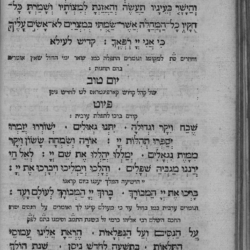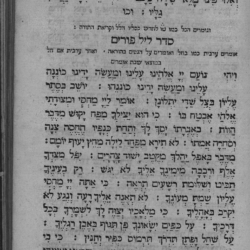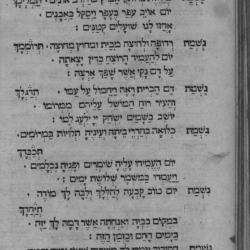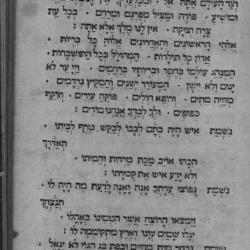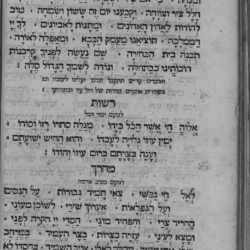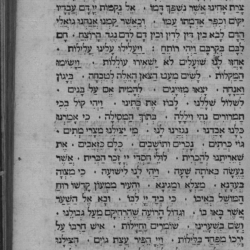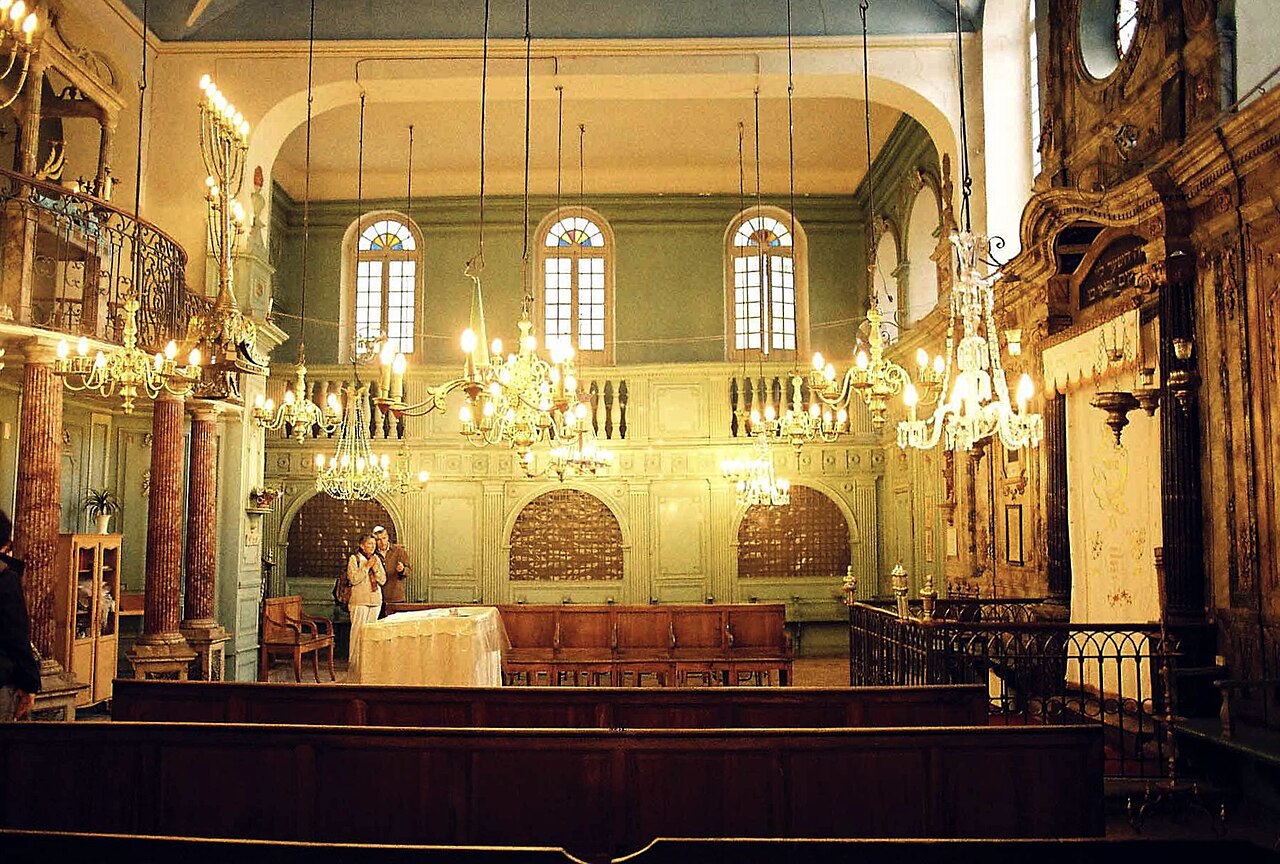Note: “The CAUSE” is used to translate the Divine Name YHVH, based on the philosophical idea of God as the Prime Mover and on the interpretation of the Name as a causative form of the copula – “causes to be.” This translation also uses the plural pronouns They/Their/Them to refer to God as a pluralis majestatis, and to avoid the implications of God being assigned a gender. (Find Ibn Ezra’s commentary on Genesis 1:1 for a discussion of the pluralis majestatis when referring to God.) All divine referents (pronouns, epithets, names) are rendered in unicase.
| Source (Hebrew) | Translation (English) |
|---|---|
|
פיוט קודם ברכו לתפלת ערבית
|
Piyyuṭ before Barkhu for the evening prayer:
|
|
שֶֽׁבַח וִיקָר וּגְדֻלָּה יִתְּנוּ גְּאוּלִים
יְשׁוֹרְרוּ יְזַמְּרוּ יְסַפְּרוּ תְּהִלּוֹת יְהֹוָה׃ אוֹרָה וְשִׂמְחָה שָׂשׂוֹן וִיקָר מִמָּֽוֶת נִגְאָלִים יְמַלְלוּ יְהַלְלוּ אֶת־שֵׁם יְהֹוָה׃ לְאֵל חַי יְרַנְּנוּ מַגְבִּֽיהַּ שְׁפָלִים וְהָלְכוּ וְיַמְלִֽיכוּ וִיבָרְכוּ אֶת־יְהֹוָה׃ |
Lauding, honor, and greatness the redeemed ones give;
They will sing, hymn, tell the praises of the Cause. Light and joy, happiness and honor, redeemed from death; They will tell, they will praise the name of the Cause. To the Living Deity, who lifts up the fallen, they cheer, And go and enthrone and bless the Cause. |
|
ואומרים ערבית כמו בחול עד כי מעולם קוינו לך
ואומרים על הנסים יסדם החכם השלם רבי אליהו כרמי זׄלׄ בשנת הׄתׄמׄבׄ וסימנו בׄתׄםׄ לפׄקׄ |
[1] In the siddur, this is preceded by the regular introduction to and text of the Barkhu written out. And finish the evening prayer as on a regular weekday, up until “Forever we have hoped in You”[2] In the Modim prayer, the final passage before an Al haNissim addition is inserted.
and say the ‘Al haNissim originating from the complete sage Rabbi Eliyahu Karmi[3] Also known as Elijah Crémieux of blessed memory in the year 5442,[4] Gregorian calendar 1682 whose mnemonic is he is in a pure state[5] The word בׄתׄםׄ is marked with upper dots, because the poem was written in the year 5442, and the gematria of בׄתׄםׄ is 442, the short count for the year. This is reflected in the English with the bold letters HEIIAUESE, which has the sum of 8+5+9+9+1+300+5+100+5=442 according to the abbreviated count. |
|
עַל־הַנִּסִּים וְעַל־הַנִּפְלָאוֹת
הֶרְאֵֽתָ אֵלֵֽינוּ עֲמוּסֵי הַתְּלָאוֹת בְּתִשְׁעָה לְחֹֽדֶשׁ נִיסָן שְׁנַת הוֹלֵךְ בְּׄתַׄםׄ |
For the miracles and for the wonders
You showed us, burdened with troubles On the ninth of the month of Nisan, The year of “he is in a pure state”[6] Find previous note.. An additional note: in the Provencal dialect, word-final nasals merged to a velar eng sound, so Nisan and tam rhymed. |
|
קָֽמוּ נֶגְדֵּֽנוּ שׂוֹנְאֵֽנוּ מַאֲלִיפוֹת בְּלִי יָדַ֣יִם רָפ֑וֹת
בְּאַף וּבְחֵמָה לְהַכְחִידֵֽנוּ בְּלִי תְּקוּמָה מִקִּנְאָה שֶׁבָּאָה לִידֵי שִׂנְאָה |
|
|
עַל־אוֹדוֹת אֲשֶׁ֨ר רָאִ֜ינוּ צָרַ֥ת אָחִ֒ינוּ֒
אֲשֶׁר נִשְׁפַּךְ דָּמוֹ אֵל־נְקָמ֥וֹת יְהֹוָ֑ה דַם־עֲבָדָ֖יו יִקּ֑וֹם וְכִפֶּ֥ר אַדְמָת֖וֹ עַמּֽוֹ |
|
|
וְכַאֲשֶׁר קַֽמְנוּ אֲנַֽחְנוּ גּוֹאֲלֵי הַדָּם
לָבֹא בֵּֽין־דִּ֣ין לְדִ֗ין וּבֵֽין־דָּ֨ם ׀ לְדָ֜ם נֶֽגֶד הָרוֹצֵֽחַ חָם לִבָּם בְּקִרְבָּם וַיְהִי רוֹתֵֽחַ וַיַּעֲלִֽילוּ עָלֵֽינוּ עֲלִילוֹת |
And as we blood-redeemers rose up,
To come between judging and judging, blood and blood[12] Find Deuteronomy 17:8 Against the murderer. Their hearts were boiling hot within them, and they schemed schemes against us. |
|
אֶֽחֱזוּ־לָ֙נוּ֙ שֻֽׁעָלִ֔ים לֹ֥א יַשְׁאִ֖רוּ עוֹלֵל֑וֹת
וַיָּשִֽׂימוּ הַמַּקְלוֹת לָשִׂים מְעַ֨ט הַצֹּ֤אן הָאֵֽלֶּה לְטִבְחָה בְּיָגוֹן וַאֲנָחָה |
|
|
יָצְאוּ מְזֻיָּנִים לְהָמִית אֵ֖ם עַל־בָּנִֽים׃
לִשְׁלֹל שְׁלָלֵֽנוּ לָבוּז אֶת־בָּתֵּֽינוּ |
They went out armed to kill mother and children alike,[16] Genesis 32:12
to loot our loot, to pillage our houses. |
|
ק֣וֹל בְּכִ֣י תַמְרוּרִ֔ים נְהִי֙ וִילָלָה
בְּת֣וֹךְ הַֽמְּסִלָּ֑ה |
|
|
כִּי אָמַֽרְנוּ כֻּלָּ֥נוּ אָבָֽדְנוּ נִגְזַ֥רְנוּ לָֽנוּ
מִי יַצִּילֵֽנוּ מִצָּרֵי מְתִים גּ֣וֹי כְּרֵתִ֑ים נׇכְרִים וְתוֹשָׁבִים כֻּלָּם כִּזְאֵבִים |
|
|
אֶת־שְׁאֵרִיתֵֽנוּ לְהַכְרִית
לוּלֵי חַסְדֵי יְהֹוָה זָכָר הַבְּרִית אֲשֶׁר נֶעֱשָׂה בְּאוֹתָהּ שָׁעָה וַיְהִי לָֽנוּ לִישׁוּעָה כִּי מִצְוָה בְּעִדָּנָא מַצְּלָא וּמַגְּנָא |
To cut down our remnant,
were it not for the Cause’s kindness, remembering the covenant that was made at that time, and was our salvation. For a commandment, when done, protects and saves.[22] Bavli Sotah 21a |
|
וְהֵעִיר מִמְּע֥וֹן קׇדְשֽׁוֹ ר֤וּחַ הַמּוֹשֵׁל֙ בְּאֵיבוֹ
כִּי בְיַד יְהֹוָה לִבּוֹ |
|
|
וּבָא אֶל־הַשַּֽׁעַר אֲשֶׁר בָּֽאוּ בוֹ
וּגְדוֹל הָרוֹעֶה שֶׁהִרְחִיקָם מֵעַל גְּבוּלֵֽנוּ וְשָׂם בִּשְׁעָרֵֽינוּ שׁוֹמְרִים וַחֲיָלוֹת אִ֤ישׁ חַרְבּוֹ֙ עַל־יְרֵכ֔וֹ מִפַּ֖חַד בַּלֵּילֽוֹת |
And They came to the gate to which they came.
And great was the Shepherd who removed them from our borders and placed in our gates guardians and soldiers — each man with sword on thigh out of night-fear.[25] Song of Songs 3:8 |
|
וַיהֹוָ֗ה הֵפִ֥יר עֲצַת־גּוֹיִ֑ם
הִצִּילָֽנוּ מִמָּֽוֶת לְחַיִּים |
And the Cause overturned the schemes of the gentiles,[26] See Psalm 33:10
Saved us from death to life. |
|
לֹ֤א לָ֥נוּ יְהֹוָ֗ה לֹ֫א־לָ֥נוּ
כִּי אִם לְמַֽעַן זְכוּת אֲבוֹתֵֽינוּ לֹא מְאָסָנוּ לְכַלּוֹתֵֽינוּ לְהָפֵר בְּרִיתוֹ אִתָּֽנוּ |
|
|
וְעַל הַיָּד שֶׁנִּשְׁתַּלְּחָה
אֵין לָֽנוּ לְהָבִיא קׇרְבַּן תּוֹדָה וּמִנְחָה כִּי אִם שִׁיר וּשְׁבָחָה הַלֵּל וְזִמְרָה בִּמְקוֹם חָלָל צִיר וּצְוָחָה וְקָבַֽעְנוּ יוֹם זֶה שָׂשׂוֹן וְשִׂמְחָה |
And due to the hand stretched out
We cannot bring thanksgiving or grain offering,[29] These two lines largely derive from the festival additional service. But rather song and laudation, praise and hymns rather that slaughter, writhing and wailing. And we established this day of happiness and joy. |
|
טוֹב לְהוֹדוֹת לָאָדוֹן הָאֲדוֹנִים וּמַתָּנ֖וֹת לָֽאֶבְיֹנִֽים
לְךָ֤ יְהֹוָה֙ הַמַּמְלָכָ֔ה תּוֹצִיאֵֽנוּ מֵעֵֽמֶק הַבָּכָא וּמֵאֲפֵלָה לְאוֹרָה תִּבְנֶה בֵּית הַבְּחִירָה שָׁם נַעֲשֶׂה לְפָנֶֽיךָ קׇרְבְּנוֹת חוֹבוֹתֵֽינוּ כְּבַתְּחִלָּה וְנוֹדֶה לְשִׁמְךָ הַגָּדוֹל סֶֽלָה׃ |
It’s good to thank the Master of masters, giving to the poor.[30] Esther 9:22
Yours, Cause, is reign![31] I Chronicles 29:11 You brought us from the vale of tears and from darkness to light. You will build the Chosen House where we will do our required offerings before You as of yore, and thank Your great name forever. |
|
ואומרים קדיש תתקבל וברכו ועלינו לשבח וכו׳.
|
And say the final Qaddish and Barkhu and ‘Aleinu etc.
|
|
בשחרית אומרים זמירות של חול עד ובתורתך׃
|
For the morning service, say Zmirot for weekdays as usual until “And in your Torah…”[32] Referring to the final line before Yishtabaḥ. In the Provençal rite, as in the modern Italian rite, after the Song of the Sea was recited the piyyut Kol B’ruei, followed by the Shema’ as introduced by this line.
|
|
רשות אֱלֹהַּ חַי אֲשֶׁר הַכֹּל בְּיָדוֹ לנועם יסוד הכל
מחרך לְאֵל חֵי נַפְשִׁי צְאִי לנועם מציב אדמה |
|
|
נשמת כל חי… עד …לבדך אנחנו מודים׃
|
From “the soul of all life” to “to You alone we thank.”[34] The first two paragraphs of the Nishmat prayer. In the siddur these paragraphs are printed in full. The following text is a nishmat piyyut, recited (in this case) as an introdution to Ilu Finu and the rest of the Nishmat prayer.
|
|
נִשְׁמַת אִׄישׁ הָיָה בְּׄתָׄםׄ לְבָבוֹ לְבַקֵּשׁ טֶֽרֶף לְבֵיתוֹ תְּאַׄדְּרָךְ
הִכָּֽהוּ אוֹיֵב מַכַּת מַרְדּוּת וְהֵמִיתוֹ וְלֹא־יָדַ֥ע אִישׁ֙ אֶת־קְבֻ֣רָת֔וֹ׃ |
The soul of a pure-hearted[35] See the note for “he is in a pure state”, spelled the same way. man there was who sought food for his home — ennoble You![36] We know the author of this piyyuṭ! It was written by R. Mordecai Astruc, who lived in the late 17th century and signed his name in a double acrostic. —
A foe struck him with rebels’ lashes and killed him.[37] i.e. A Jew was murdered by a gentile and buried in secret. No man knew his grave![38] Deuteronomy 34:6 |
|
נִשְׁמַת נָׄפֽוֹצוּ עֲדָתֶֽךָ אָנֶה וָאָנָה לָדַֽעַת מֶה־הָֽיָה לוֹ תְּנַׄצְּחָךְ
וַיִּמְצְאוּ הָרוֹצֵֽחַ אֲשֶׁר הִטְמִינוֹ בְּאׇהֳלוֹ יְגַלּ֣וּ שָׁמַ֣יִם עֲוֺנ֑וֹ וְ֝אֶ֗רֶץ מִתְקוֹמָ֘מָ֥ה לֽוֹ׃ |
|
|
נִשְׁמַת יִׄבְחַר מָֽוֶת מֵחַיִּים וּבְפַת־בַּג הַגּוֹי לֹא יִגָּאֵל תְּיַׄעֲדָךְ
וּבְמוֹתוֹ הִטְבִּיעוֹ בַּנָּהָר יַֽעַן לֹא יִמְצָאֵֽהוּ הַגּוֹאֵל הֵ֚מָּה מֵ֣י מְרִיבָ֔ה אֲשֶׁר־רָב֥וּ בְנֵֽי־יִשְׂרָאֵ֖ל׃ |
The soul of he who chose[41] Printed is נִבְחַר, “will be chosen,” a printer’s error to make the text closer to Jeremiah 8:3 but which breaks the acrostic. Thanks to Yosef Razin for suggesting this emendation! death over life was unredeemed by the gentile allotment — designate You! —
and in his death they drowned him in the river since they found no redeemer.[42] He was drowned for his crime. These are the waters of strife, where the children of Israel strove.[43] Numbers 20:13 |
|
נִשְׁמַת מְׄיַחֶֽלֶת פְּדוּתְךָ אַמִּיץ כֹּֽחַ וְרֹב אוֹנִים תַּמְׄלִיכָךְ
יוֹם אוֹיֵב עִפַּר בֶּעָפָר וַיְּסַקֵּל בַּאֲבָנִים אֶֽחֱזוּ־לָ֙נוּ֙ שֻֽׁעָלִ֔ים שֻׁעָלִ֥ים קְטַנִּ֖ים |
|
|
נִשְׁמַת רְׄדוּפָה וּלְחוּצָה מִבַּֽיִת וּמִחוּץ מְחוּצָה תְּרׄוֹמְמָךְ
יוֹם לְהַעֲמִיד הָרוֹצֵֽחַ בַּדִּין יָצָא עַל דָּם נָקִי אֲשֶׁר שָׁפַךְ אַֽרְצָה׃ |
The soul pursued and stressed, inside and outside crushed — exalt You! —
on the day of making the murderer stand in judgment, he went out[46] Printed is יָצָאתָה, “you went out,” a printer’s error which breaks the rhyme. for the innocent blood he had spilled earthward. |
|
נִשְׁמַת דַּׄם הַבְּרִית רָאָה וַיַחֲמוֹל עַל־עַמּוֹ תְּדַׄגְּלָךְ
וְהֵעִיר רֽוּחַ הַמּוֹשֵׁל עֲלֵיהֶם מִמְּרוֹמוֹ יוֹשֵׁ֣ב בַּשָּׁמַ֣יִם יִשְׂחָ֑ק אֲ֝דֹנָ֗י יִלְעַג־לָֽמוֹ׃ |
The soul of the covenant-blood They saw, and had mercy on Their people — distinguish You! —
and from Their heights aroused the ruler’s spirit upon them.[47] The rector of the Comtat sent forces to defend the Jews, which the poet credits to divine intervention. The heaven-dweller laughs; my Master mocks them![48] Psalms 2:4 |
|
נִשְׁמַת כְּׄלוּאָה בְּחַדְרֵי בֵיתָהּ וְעֵינֶֽיהָ תְּלוּיוֹת בַּמְּרוֹמִים תְּכַׄבְּדָךְ
יוֹם הֶעֱמִֽידוּ עָלֶֽיהָ שׁוֹמְרִים וּפָנֶֽיהָ נִכְלָמִים וַיַּעַמְדוּ בַּמִשְׁמָ֖ר שְׁלֹ֥שֶׁת יָמִֽים׃ |
The soul confined in her houses’ rooms, her eyes hanging on heaven — honor You! —
on the day they made guardians stand, their faces ashamed, and they stood on guard three days.[49] Find Genesis 42:17 |
|
נִשְׁמַת יׄוֹם טוֹב קָבְעָה לְהַלְּלָךְ וְלִבָּהּ לָךְ מוֹדֶה תְּיַׄחֲדָךְ
בִּמְקוֹם בִּכְיָה וְאַנְחָתָה אֲשֶׁר דָּמָהּ לָךְ יַזֶּה בַּיָּמִים הַהֵם וּבַזְּמַן הַזֶּה׃ |
The soul established a holiday to praise You, her heart thanking You[50] In the Provençal dialect, intervocalic ד was pronounced /z/, so מוֹדֶה is a slant rhyme withיַזֶּה.. It’s not a full rhyme because ז itself was in the process of shifting to /v/. Provençal Hebrew was weird. — unify You! —
in place of weeping and moaning whose blood would be scattered to You, in those days and at this time.[51] From the Al haNisim paragraph, as well as the She-’Asa Nisim blessing. |
|
נִשְׁמַת חֲסִ ידֶֽיךָ יְזַֽמְּרוּ־לָךְ מַשְׁבִּ֤יחַ ׀ שְׁא֣וֹן יַ֭מִּים וְדׇכְיָם תְּחַסְּנָךְ
מַדְלִיקִין נֵרוֹת בְּחַצְרוֹת קׇדְשֶֽׁךָ בְּאֶֽרֶץ שִׁבְיָם אוֹמְרִים וְאִֽלּוּ פִֽינוּ מָלֵא שִׁירָה כַּיָּם׃ |
The soul of Your pious ones[52] The double acrostic for this verse is of unclear meaning. It is marked as the two letters חס, which doesn’t fit with the rest of the piyyut’s אני מרדכי.. It can’t be an abbreviated form of last name Astruc, because he signs it elsewhere in piyyutim as אשטרוק.. And none of the common abbreviations for חׄסׄ make sense in context. Any ideas in the comments would be appreciated! will hymn to You who stills the raging seas[53] Psalms 65:8 and their pounding — fortify You —
lighting candles in Your holy courts in the land of their captivity, saying “And if our mouths were as full of song as the sea…” (verse) |
|
וגומרים הכל כמו טו לחדש כסליו הלל וקריאת התורה׃
|
Source(s)
Notes
| 1 | In the siddur, this is preceded by the regular introduction to and text of the Barkhu written out. |
|---|---|
| 2 | In the Modim prayer, the final passage before an Al haNissim addition is inserted. |
| 3 | Also known as Elijah Crémieux |
| 4 | Gregorian calendar 1682 |
| 5 | The word בׄתׄםׄ is marked with upper dots, because the poem was written in the year 5442, and the gematria of בׄתׄםׄ is 442, the short count for the year. This is reflected in the English with the bold letters HEIIAUESE, which has the sum of 8+5+9+9+1+300+5+100+5=442 |
| 6 | Find previous note.. An additional note: in the Provencal dialect, word-final nasals merged to a velar eng sound, so Nisan and tam rhymed. |
| 7 | A hard to translate pun on Psalm 144:13’s “our thousandfold flocks” — with “our flocks” as tsonenu and “our foes” sonenu. |
| 8 | Isaiah 35:3 |
| 9 | Find Genesis 42:21 |
| 10 | Psalms 94:1 |
| 11 | Deuteronomy 32:43 |
| 12 | Find Deuteronomy 17:8 |
| 13 | Song of Songs 2:15 |
| 14 | Jeremiah 49:9, Obadiah 1:5 |
| 15 | I Samuel 17:28 |
| 16 | Genesis 32:12 |
| 17 | See Jeremiah 31:15 |
| 18 | II Samuel 20:12 |
| 19 | Numbers 17:27 |
| 20 | Ezekiel 37:11 |
| 21 | Zephaniah 2:5. Here used as an allegory for the Christian community. |
| 22 | Bavli Sotah 21a |
| 23 | Zechariah 2:17 |
| 24 | Ecclesiastes 10:4 |
| 25 | Song of Songs 3:8 |
| 26 | See Psalm 33:10 |
| 27 | Psalms 115:1 |
| 28 | Find Leviticus 26:44 |
| 29 | These two lines largely derive from the festival additional service. |
| 30 | Esther 9:22 |
| 31 | I Chronicles 29:11 |
| 32 | Referring to the final line before Yishtabaḥ. In the Provençal rite, as in the modern Italian rite, after the Song of the Sea was recited the piyyut Kol B’ruei, followed by the Shema’ as introduced by this line. |
| 33 | Both of these piyyutim were also recited on 15 Kislev in the Carpentras custom, and have thus already been transcribed. They can be found here. |
| 34 | The first two paragraphs of the Nishmat prayer. In the siddur these paragraphs are printed in full. The following text is a nishmat piyyut, recited (in this case) as an introdution to Ilu Finu and the rest of the Nishmat prayer. |
| 35 | See the note for “he is in a pure state”, spelled the same way. |
| 36 | We know the author of this piyyuṭ! It was written by R. Mordecai Astruc, who lived in the late 17th century and signed his name in a double acrostic. |
| 37 | i.e. A Jew was murdered by a gentile and buried in secret. |
| 38 | Deuteronomy 34:6 |
| 39 | The gentile murderer was found. |
| 40 | Job 20:27 |
| 41 | Printed is נִבְחַר, “will be chosen,” a printer’s error to make the text closer to Jeremiah 8:3 but which breaks the acrostic. Thanks to Yosef Razin for suggesting this emendation! |
| 42 | He was drowned for his crime. |
| 43 | Numbers 20:13 |
| 44 | A mob began to form, throwing rocks and dirt. |
| 45 | Song of Songs 2:15 |
| 46 | Printed is יָצָאתָה, “you went out,” a printer’s error which breaks the rhyme. |
| 47 | The rector of the Comtat sent forces to defend the Jews, which the poet credits to divine intervention. |
| 48 | Psalms 2:4 |
| 49 | Find Genesis 42:17 |
| 50 | In the Provençal dialect, intervocalic ד was pronounced /z/, so מוֹדֶה is a slant rhyme withיַזֶּה.. It’s not a full rhyme because ז itself was in the process of shifting to /v/. Provençal Hebrew was weird. |
| 51 | From the Al haNisim paragraph, as well as the She-’Asa Nisim blessing. |
| 52 | The double acrostic for this verse is of unclear meaning. It is marked as the two letters חס, which doesn’t fit with the rest of the piyyut’s אני מרדכי.. It can’t be an abbreviated form of last name Astruc, because he signs it elsewhere in piyyutim as אשטרוק.. And none of the common abbreviations for חׄסׄ make sense in context. Any ideas in the comments would be appreciated! |
| 53 | Psalms 65:8 |
| 54 | The poem before hallel and Torah reading, also recited on 15 Kislev, can be found here. |
